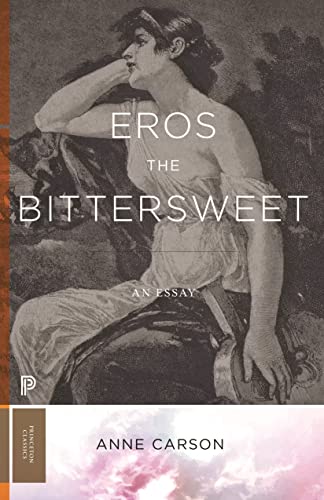
Eros the Bittersweet: An Essay (Princeton Classics)

Who is the real subject of most love poems? Not the beloved. It is that hole.
Anne Carson • Eros the Bittersweet: An Essay (Princeton Classics)
it broke these pronounced units of sound apart into their acoustic components.
Anne Carson • Eros the Bittersweet: An Essay (Princeton Classics)
desire can only be for what is lacking, not at hand, not present, not in one’s possession nor in one’s being:
Anne Carson • Eros the Bittersweet: An Essay (Princeton Classics)
the wooer stands at the edge of his value as a person and asserts a claim across the boundaries of another.
Anne Carson • Eros the Bittersweet: An Essay (Princeton Classics)
The moment when the soul
Anne Carson • Eros the Bittersweet: An Essay (Princeton Classics)
an object of desire.
Anne Carson • Eros the Bittersweet: An Essay (Princeton Classics)
I would not be in want of you unless you had partaken of me, the lover reasons.
Anne Carson • Eros the Bittersweet: An Essay (Princeton Classics)
shift of distance, which Aristotle calls an epiphora (Poet. 21.1457b7), bringing two heterogeneous things close to reveal their kinship.
Anne Carson • Eros the Bittersweet: An Essay (Princeton Classics)
“Desire is a reaching out [orexis] for the sweet,” he says, and the man who is reaching for some delight, whether in the future as hope or in the past as memory, does so by means of an act of imagination